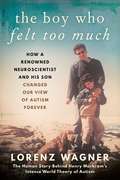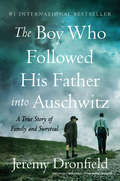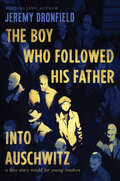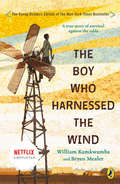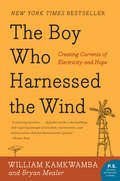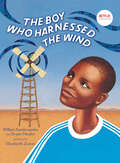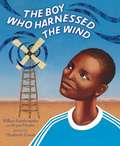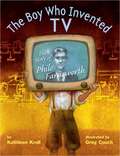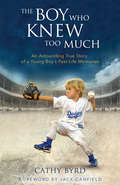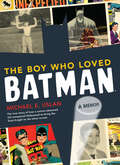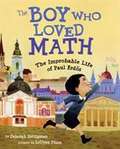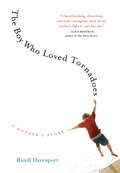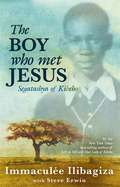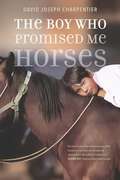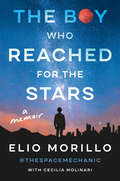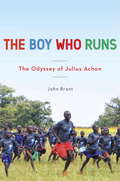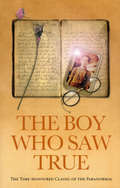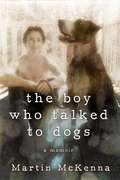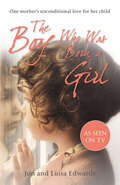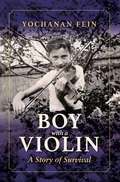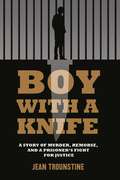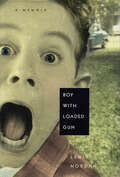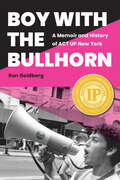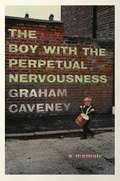- Table View
- List View
The Boy Who Felt Too Much: How a Renowned Neuroscientist and His Son Changed Our View of Autism Forever
by Lorenz WagnerAn International Bestseller, the Story behind Henry Markram&’s Breakthrough Theory about Autism, and How a Family&’s Unconditional Love Led to a Scientific Paradigm Shift Henry Markram is the Elon Musk of neuroscience, the man behind the billion-dollar Blue Brain Project to build a supercomputer model of the brain. He has set the goal of decoding all disturbances of the mind within a generation. This quest is personal for him. The driving force behind his grand ambition has been his son Kai, who has autism. Raising Kai made Henry Markram question all that he thought he knew about neuroscience, and then inspired his groundbreaking research that would upend the conventional wisdom about autism, expressed in his now-famous theory of Intense World Syndrome. When Kai was first diagnosed, his father consulted studies and experts. He knew as much about the human brain as almost anyone but still felt as helpless as any parent confronted with this condition in his child. What&’s more, the scientific consensus that autism was a deficit of empathy didn&’t mesh with Markram&’s experience of his son. He became convinced that the disorder, which has seen a 657 percent increase in diagnoses over the past decade, was fundamentally misunderstood. Bringing his world-class research to bear on the problem, he devised a radical new theory of the disorder: People like Kai don&’t feel too little; they feel too much. Their senses are too delicate for this world.
The Boy Who Followed His Father into Auschwitz: A True Story of Family and Survival
by Jeremy Dronfield“Brilliantly written, vivid, a powerful and often uncomfortable true story that deserves to be read and remembered. It beautifully captures the strength of the bond between a father and son.”--Heather Morris, author of #1 New York Times bestseller The Tattooist of AuschwitzThe #1 Sunday Times bestseller—a remarkable story of the heroic and unbreakable bond between a father and son that is as inspirational as The Tattooist of Auschwitz and as mesmerizing as The Choice.Where there is family, there is hopeIn 1939, Gustav Kleinmann, a Jewish upholster from Vienna, and his sixteen-year-old son Fritz are arrested by the Gestapo and sent to Germany. Imprisoned in the Buchenwald concentration camp, they miraculously survive the Nazis’ murderous brutality.Then Gustav learns he is being sent to Auschwitz—and certain death.For Fritz, letting his father go is unthinkable. Desperate to remain together, Fritz makes an incredible choice: he insists he must go too. To the Nazis, one death camp is the same as another, and so the boy is allowed to follow. Throughout the six years of horror they witness and immeasurable suffering they endure as victims of the camps, one constant keeps them alive: their love and hope for the future. Based on the secret diary that Gustav kept as well as meticulous archival research and interviews with members of the Kleinmann family, including Fritz’s younger brother Kurt, sent to the United States at age eleven to escape the war, The Boy Who Followed His Father into Auschwitz is Gustav and Fritz’s story—an extraordinary account of courage, loyalty, survival, and love that is unforgettable.
The Boy Who Followed His Father into Auschwitz: A True Story Retold for Young Readers
by Jeremy DronfieldThis powerful, moving middle grade adaptation of the adult international bestselling narrative nonfiction book The Boy Who Followed His Father into Auschwitz shines a light on the true story of two brothers who experienced the atrocities of the Holocaust in very different ways.Fritz Kleinmann was fourteen when the Nazis took over Vienna. Kurt, his little brother, was eight. Under Hitler’s brutal regime, their Austrian-Jewish family of six was cruelly torn apart.Taken to Buchenwald concentration camp, Fritz and his Papa, Gustav, underwent hard labor and starvation. Meanwhile, Kurt made the difficult voyage, all alone, to America, to escape the war.When Papa was ordered to the infamous Auschwitz concentration camp, Fritz—desperate not to lose his beloved father—insisted he must go too. Together, they endured countless atrocities to survive.Jeremy Dronfield authentically and accurately captures this family tale of bravery, love, hope, and survival with the help of extensive research and primary sources like Gustav’s diary and interviews with family members. Maps, black-and-white photos, a timeline of events, a glossary, and more are included.
The Boy Who Harnessed the Wind: Young Readers Edition (P. S. Series)
by Anna Hymas Bryan Mealer William KamkwambaWhen a terrible drought struck William Kamkwamba's tiny village in Malawi, his family lost all of the season's crops, leaving them with nothing to eat and nothing to sell. William began to explore science books in his village library, looking for a solution. There, he came up with the idea that would change his family's life forever: he could build a windmill. Made out of scrap metal and old bicycle parts, William's windmill brought electricity to his home and helped his family pump the water they needed to farm the land.Retold for a younger audience, this exciting memoir shows how, even in a desperate situation, one boy's brilliant idea can light up the world. Complete with photographs, illustrations, and an epilogue that will bring readers up to date on William's story, this is the perfect edition to read and share with the whole family.
The Boy Who Harnessed the Wind: Creating Currents of Electricity and Hope (P. S. Series)
by William Kamkwamba Bryan Mealer<P>William Kamkwamba was born in Malawi, a country where magic ruled and modern science was mystery. It was also a land withered by drought and hunger, and a place where hope and opportunity were hard to find. <P>But William had read about windmills in a book called Using Energy, and he dreamed of building one that would bring electricity and water to his village and change his life and the lives of those around him. His neighbors may have mocked him and called him misala--crazy--but William was determined to show them what a little grit and ingenuity could do. Enchanted by the workings of electricity as a boy, William had a goal to study science in Malawi's top boarding schools. <P>But in 2002, his country was stricken with a famine that left his family's farm devastated and his parents destitute. Unable to pay the eighty-dollar-a-year tuition for his education, William was forced to drop out and help his family forage for food as thousands across the country starved and died.Yet William refused to let go of his dreams. With nothing more than a fistful of cornmeal in his stomach, a small pile of once-forgotten science textbooks, and an armory of curiosity and determination, he embarked on a daring plan to bring his family a set of luxuries that only two percent of Malawians could afford and what the West considers a necessity -- electricity and running water. <P>Using scrap metal, tractor parts, and bicycle halves, William forged a crude yet operable windmill, an unlikely contraption and small miracle that eventually powered four lights, complete with homemade switches and a circuit breaker made from nails and wire. A second machine turned a water pump that could battle the drought and famine that loomed with every season. <P>Soon, news of William's magetsi a mphepo--his "electric wind"--spread beyond the borders of his home, and the boy who was once called crazy became an inspiration to those around the world. Here is the remarkable story about human inventiveness and its power to overcome crippling adversity. The Boy Who Harnessed the Wind will inspire anyone who doubts the power of one individual's ability to change his community and better the lives of those around him. <P><b>A New York Times Bestseller</b>
The Boy Who Harnessed the Wind: Picture Book Edition
by William Kamkwamba Bryan MealerNow a Netflix film starring and directed by Chiwetel Ejiofor, this is a gripping memoir of survival and perseverance about the heroic young inventor who brought electricity to his Malawian village. When a terrible drought struck William Kamkwamba's tiny village in Malawi, his family lost all of the season's crops, leaving them with nothing to eat and nothing to sell. William began to explore science books in his village library, looking for a solution. There, he came up with the idea that would change his family's life forever: he could build a windmill. Made out of scrap metal and old bicycle parts, William's windmill brought electricity to his home and helped his family pump the water they needed to farm the land. Retold for a younger audience, this exciting memoir shows how, even in a desperate situation, one boy's brilliant idea can light up the world. Complete with photographs, illustrations, and an epilogue that will bring readers up to date on William's story, this is the perfect edition to read and share with the whole family.
The Boy Who Harnessed the Wind: Young Readers Edition
by William Kamkwamba Bryan Mealer Anna HymasNIMAC-sourced textbook
The Boy Who Harnessed The Wind
by William Kamkwamba Bryan Mealer Elizabeth ZunonWhen fourteen-year-old William Kamkwamba's Malawi village was hit by a drought, everyone's crops began to fail. Without enough money for food, let alone school, William spent his days in the library... <P> and figured out how to bring electricity to his village. Persevering against the odds, William built a functioning windmill out of junkyard scraps, and thus became the local hero who harnessed the wind. Lyrically told and gloriously illustrated, this story will inspire many as it shows how - even in the worst of times - a great idea and a lot of hard work can still rock the world.
The Boy Who Invented TV: The Story of Philo Farnsworth
by Kathleen KrullAn inspiring true story of a boy genius. Plowing a potato field in 1920, a 14-year-old farm boy from Idaho saw in the parallel rows of overturned earth a way to "make pictures fly through the air." This boy was not a magician; he was a scientific genius and just eight years later he made his brainstorm in the potato field a reality by transmitting the world's first television image. This fascinating picture-book biography of Philo Farnsworth covers his early interest in machines and electricity, leading up to how he put it all together in one of the greatest inventions of the 20th century. The author's afterword discusses the lawsuit Farnsworth waged and won against RCA when his high school science teacher testified that Philo's invention of television was years before RCA's.
The Boy Who Knew Too Much: An Astounding True Story of a Young Boy's Past-Life Memories
by Cathy Byrd"Mommy, I used to be a tall baseball player.""Yes, you will be a tall baseball player someday."With a look of exasperation, he stomped his foot and hollered."No! I was a tall baseball player —tall like Daddy!"What was my son trying to say to me? Did he mean . . . he couldn’t mean . . . was he trying to tell me that he was a grown-up in a previous lifetime?At the tender age of two, baseball prodigy Christian Haupt began sharing vivid memories of being a baseball player in the 1920s and ’30s. From riding cross-country on trains, to his fierce rivalry with Babe Ruth, Christian described historical facts about the life of American hero and baseball legend Lou Gehrig that he could not have possibly known at the time.Distraught by her son’s uncanny revelations, Christian’s mother, Cathy, embarked on a sacred journey of discovery that would shake her beliefs to the core and forever change her views on life and death.In this compelling and heartwarming memoir, Cathy Byrd shares her remarkable experiences, the lessons she learned as she searched to find answers to this great mystery, and a story of healing in the lives of these intertwined souls.The Boy Who Knew Too Much will inspire even the greatest skeptics to consider the possibility that love never dies.
The Boy Who Loved Batman: A Memoir
by Michael E. UslanIs any superhero cooler than Batman? He s a crime-fighting vigilante with a tragic past, a lawless attitude, and a seemingly endless supply of high-tech gadgetry. In this fully illustrated memoir, author Michael Uslan recalls his journey from early childhood fandom through to the decades he spent on a caped crusade of his own: to bring Batman to the silver screen as the dark, serious character he was at heart. Uslan's story traces his path from the wilds of New Jersey to the limelight of Hollywood, following his work as Executive Producer on every Batman film from Tim Burton s 1989 re-envisioning to 2012's The Dark Knight Rises. Through it all, he helped to create one of the most successful pop culture franchises of all time.
The Boy Who Loved Math: The Improbable Life of Paul Erdos
by Deborah HeiligmanMost people think of mathematicians as solitary, working away in isolation. And, it's true, many of them do. But Paul Erdos never followed the usual path. At the age of four, he could ask you when you were born and then calculate the number of seconds you had been alive in his head. But he didn't learn to butter his own bread until he turned twenty. Instead, he traveled around the world, from one mathematician to the next, collaborating on an astonishing number of publications. With a simple, lyrical text and richly layered illustrations, this is a beautiful introduction to the world of math and a fascinating look at the unique character traits that made "Uncle Paul" a great man.
The Boy Who Loved Tornadoes: A Mother's Story
by Randi Davenport“A heartbreaking, disturbing, and truly courageous story of one mother’s fight to save her son” (Alice Hoffman, New York Times–bestselling author). Randi Davenport’s young son, Chase, kept having problems, but a diagnosis proved elusive. Some said it was autism, others, ADHD—but as time went by, the problems only increased. She worked hard to provide her family with a sense of stability and strength, but her husband’s erratic behavior only made the situation worse. Eventually, James Davenport slipped into his own world, leaving his wife and kids behind. At fifteen, Chase entered an unremitting psychosis—pursued by terrifying images, unable to recognize his own mother, unwilling to eat or even talk. This is the heartbreaking yet triumphant story of how a single mother navigated the byzantine and broken health care system, and managed to not just save her son from the brink of suicide, but bring him back to her and make her family whole again. The Boy Who Loved Tornadoes is “an unforgettable memoir of a shattered family, a mother’s abiding love, and the frightening permutations of the human mind” (Elle). “A gripping and deeply compelling book about a mother’s search for the proper care and treatment for her psychotic son. Davenport shows us the gritty and enraging reality of our long fractured mental health system . . . The best book I’ve read about mental illness since Kay Jamison’s An Unquiet Mind.” —Virginia Holman, author of Rescuing Patty Hearst: Growing Up Sane in a Decade Gone Mad “A brave and beautiful story by a born writer . . .This book is like a beacon, offering clarity, inspiration, and validation for us all, especially those of us, like myself, who have struggled with serious mental illness in our families.” —Lee Smith, author of Mrs. Darcy and the Blue-Eyed Stranger
The Boy Who Met Jesus: Segatashya of Kibeho
by Immaculée Ilibagiza Steve ErwinIt's the greatest story never told: that of a boy who met Jesus and dared to ask him all the questions that have consumed mankind since the dawn of time. No matter what one's faith or religious beliefs are, Segatashya's words will bring comfort and joy.
The Boy Who Promised Me Horses
by David Joseph Charpentier&“He tried to outrun a train,&” Theodore Blindwoman told David Joseph Charpentier the night they found out about Maurice Prairie Chief&’s death. When Charpentier was a new teacher at St. Labre Indian School in Ashland, Montana, Prairie Chief was the first student he met and the one with whom he formed the closest bonds. From the shock of moving from a bucolic Minnesota college to teach at a small, remote reservation school in eastern Montana, Charpentier details the complex and emotional challenges of Indigenous education in the United States. Although he intended his teaching tenure at St. Labre to be short, Charpentier&’s involvement with the school has extended past thirty years. Unlike many white teachers who came and left the reservation, Charpentier has remained committed to the potentialities of Indigenous education, motivated by the early friendship he formed with Prairie Chief, who taught him lessons far and wide, from dealing with buffalo while riding a horse to coping with student dropouts he would never see again. Told through episodic experiences, the story takes a journey back in time as Charpentier searches for answers to Prairie Chief&’s life. As he sits on top of the sledding hill near the cemetery where Prairie Chief is buried, Charpentier finds solace in the memories of their shared (mis)adventures and their mutual respect, hard won through the challenges of educational and cultural mistrust.
The Boy Who Reached for the Stars: A Memoir
by Elio Morillo"Heartwarming... infectious ... [Morillo's The Boy Who Reached for the Stars] is every bit the inspiration he means it to be." –Kirkus ReviewsThe engineer known as the “space mechanic” speaks to both our future and past in this breathless memoir of his journey from Ecuador to NASA and beyond.Elio Morillo’s life is abruptly spun out of orbit when economic collapse and personal circumstances compel his mother to flee Ecuador for the United States in search of a better future for her son. His itinerant childhood sets into motion a migration that will ultimately carry Elio to the farthest expanse of human endeavor: space.Overcoming a history of systemic adversity and inequality in public education, Elio forged ahead on a journey as indebted to his galactic dreams as to a loving mother whose sacrifices safeguarded the ground beneath his feet. Today, Elio is helping drive human expansion into the solar system and promote the future of human innovation—from AI and robotics to space infrastructure and equitable access.The Boy Who Reached the Stars is both a cosmic and intimate memoir spun from a constellation of memories, reflections, and intrepid curiosity, as thoroughly luminous as the stars above.
The Boy Who Runs: The Odyssey of Julius Achon
by John BrantIn the tradition of Uzodinma Iweala's Beasts of No Nation by way of Christopher McDougall's Born to Run, this is the inspirational true story of the Ugandan boy soldier who became a world-renowned runner, then found his calling as director of a world-renowned African children's charity."Julius can't remember who first saw the men. He heard no warning sounds--no dog barking or twig snapping. Until this point, events had moved too swiftly for Julius to be afraid, but now panic seized him. In another instant, he realized that his old life was finished." Thus begins the extraordinary odyssey of Julius Achon, a journey that takes a barefoot twelve-year-old boy from a village in northern Uganda to the rebel camp of the notorious Lord's Resistance Army, where he was made a boy soldier, and then, miraculously, to a career as one of the world's foremost middle-distance runners. But when a devastating tragedy prevents Julius from pursuing the gold at the 2004 Olympic Games in Athens, he is once again set adrift and forced to forge a new path for himself, finally finding his true calling as an internationally recognized humanitarian. Today, Julius is the director of the Achon Uganda Children's Fund, a charity whose mission is to improve the quality of life in rural Uganda through access to healthcare, education, and athletics. While pursuing his destiny, Julius encounters a range of unforgettable characters who variously befriend and betray him: the demonic Joseph Kony, a "world-class warlord"; John Cook, a brilliant and eccentric U.S. track coach; Jim Fee, an American businessman who helps Julius build a state-of-the-art medical center deep in the Ugandan bush; and finally Kristina, Julius's mother, whose own tragic journey forms the pivot for this spellbinding narrative of love, loss, suffering, and redemption. Written by award-winning sportswriter John Brant, The Boy Who Runs is an empowering tale of obstacles overcome, challenges met, and light wrested from darkness. It's a story about forging your true path and finding your higher purpose--even when the road ahead bends in unexpected directions.Advance praise for The Boy Who Runs"Brant proves again why he is one of our best sportswriters, masterfully weaving a compelling narrative of an African country at war, along with the transformation of a young man from athlete to humanitarian. . . . [Achon's] life story is a shining example of the Olympic spirit."--Booklist (starred review)"Fantastic . . . Brant does a beautiful job of chronicling the tension. . . . Indeed, his work is first-rate throughout the book, and it makes for a read-in-one-sitting story."--Publishers Weekly (starred review)"Inspiring . . . Achon's difficult journey as an athlete and humanitarian reveals how sport can provide a valuable avenue of hope for those seeking to rise above tragic circumstances."--Library Journal"This is an astonishing story about an amazing athlete who outruns not only the grinding poverty and deprivation of the Ugandan bush but brutal war and imminent death, then dedicates himself to saving his family and friends. This man has the heart of a lion. I couldn't put this book down."--John L. Parker, Jr., author of Once a Runner "An instant classic . . . John Brant has given us an epic, moving, and ultimately hopeful story about the power of sport and friendship to transcend boundaries and make the world a better place."--Daniel Coyle, author of The Talent CodeFrom the Hardcover edition.
The Boy Who Saw True: The Time-Honoured Classic of the Paranormal
by AnonThe Boy Who Saw True is based on the diary entries of a young Victorian boy whose extraordinary supernatural talent reveals itself within these pages. By turns naïve, insightful, funny and moving, it is an extremely convincing account of a precocious paranormal talent, and all the more persuasive because the young diarist never sets out to win over his readers. Born with incredible clairvoyant powers, the anonymous author could see auras and spirits, yet failed to realise that other people were not similarly gifted. This remarkable book has become a paranormal classic.
The Boy Who Talked to Dogs: A Memoir
by Martin MckennaWhen Martin McKenna was growing up in Garryowen, Ireland, in the 1970s, he felt the whole world knew him as just "that stupid boy.” Badly misunderstood by his family and teachers, Martin escaped from endless bullying by running away from home and eventually adopting-or being adopted by-six street dogs. Camping out in barns, escaping from farmers, and learning to fend for himself by caring for his new friends, Martin discovered a different kind of language, strict laws of behavior, and strange customs that defined the world of dogs. More importantly, his canine companions helped him understand the vital importance of family, courage, and self-respect-and that he wasn’t stupid after all. Their lessons helped Martin make a name for himself as the "Dog Man” in Australia, where he now lives and dispenses his hard-earned wisdom to dog owners who are sometimes baffled by what their four-legged friends are trying to tell them.An emotional and poignant story seasoned with plenty of Frank McCourt-style humor, The Boy Who Talked to Dogs is an inspiration to anyone who’s ever been told he or she won’t amount to anything. It’s also a unique, fascinating look into canine behavior. In these pages, Martin shows how modern life has conditioned dogs to act around humans, in some ways helpful, but in other ways unnatural to their true instincts, and how he has benefited enormously from learning to "talk dog.”
The Boy Who Was Born a Girl: One Mother’s Unconditional Love for Her Child
by Jon Edwards Luisa EdwardsBrought up as female for fifteen years, Jon can remember feeling different from other girls since he was only five years old. But it will take years of depression, incessant bullying, self-harm and isolation before he discovers why.When Jon eventually confides to his mother that he feels like a boy, Luisa commits herself unconditionally to helping her child.For Jon, the changes that follow are his path to happiness. But for Luisa, this means coming to terms with the enormous loss of her daughter.
Boy with a Violin: A Story of Survival
by Yochanan FeinOn June 22, 1941, the German invasion of the Soviet Union began. In a matter of days, the war reached the suburbs of Kaunas, Lithuania, where a young Jewish violinist, Yochanan Fein, led a happy childhood. On June 22, 1941, that childhood ended.In Boy with a Violin, Fein recounts his early life under Nazi occupation—his survival in the Kaunas Ghetto, the separation from his parents, his narrow escapes from death at the hands of Nazi officers, the harrowing stories of those he knew who did not survive, and the abhorrent conditions he endured while in hiding. He tells the tale of his rescuer, Jonas Paulavičius, the Lithuanian carpenter who sought to save the Jewish spirit. Paulavičius rescued those he believed could rebuild in the wake of the Holocaust, hiding engineers and doctors in his underground Noah's Ark. Among the sixteen he saved stood one fourteen-year-old violinist.Following liberation, Fein describes the aftermath of the war as survivors returned to what was left of their homes and attempted to piece together the fragmented remains of their lives. He recounts the difficulties of returning to some semblance of normal life in the midst of a complex political climate, culminating in his daring escape from Soviet Lithuania.In one of the darkest eras of human history, there were those who proved that the goodness of the human spirit survives against all odds. Boy with a Violin pays tribute to those who risked everything to save a life, and whose altruism crossed the boundaries of race and religion. In this first English translation of Boy with a Violin, Fein continues to offer his testimony to the strength of the human spirit.
Boy With A Knife
by Jean TrounstineNearly a quarter of a million youth are tried, sentenced, or imprisoned as adults every year across the United States. On any given day, ten thousand youth are detained or incarcerated in adult jails and prisons. Putting a human face to these sobering statistics, Boy With A Knife tells the story of Karter Kane Reed, who, at the age of sixteen, was sentenced to life in an adult prison for a murder he committed in 1993 in a high school classroom. Twenty years later, in 2013, he became one of the few men in Massachusetts to sue the Parole Board and win his freedom. The emotional and devastating narrative takes us step by step through Karter's crime, trial, punishment, and survival in prison, as well as his readjustment into regular society. In addition to being a powerful portrayal of one boy trying to come to terms with the consequences of his tragic actions, Boy With A Knife is also a searing critique of the practice of sentencing youth to adult prisons, providing a wake-up call on how we must change the laws in this country that allow children to be sentenced as adults.
Boy with Loaded Gun: A Memoir
by Lewis NordanLewis Nordan is famous for his special vision of the Mississippi Delta. His characters, for whom the closest-though hopelessly inadequate-description might be "eccentrics," share the stage with swamp elves and midgets living in the backyard. His fiction is unlike anybody else's and is as dark, hilarious, and affecting as any ever written. It's also writing that lays bare the agony of adolescence and plows, as the Cleveland Plain Dealer once put it, "the fields of puzzling wonder that precede the responsibilities and disappointments of adulthood." What bred and fed Nordan's imagination, his originality, his indefatigable sense of humor? The answers aren't obvious. But now that Lewis Nordan produces, directs, and stars in his own story, we just might find out. Nordan's mother was widowed when he was a baby, and she went back to her home town to remarry and raise her only son "Buddy." Itta Bena, Mississippi, was a prototypical fifties Delta town, so drowsy that even before puberty, Nordan had made his escape plans. What happened next was pretty typical-a stint in the Navy, college in Mississippi, very early marriage, young fatherhood, alcoholism, infidelities, broken hearts. But in Nordan's hands, the typical turns into the transcendent and, at the heart of things, there is always the irrepressible laughter. Horrible things and horribly funny things happen in Boy with Loaded Gun, but it's that heart that leads us through Lewis Nordan's dark tunnel and back into the light.
Boy with the Bullhorn: A Memoir and History of ACT UP New York
by Ron GoldbergA coming-of-age memoir of life on the front lines of the AIDS crisis with ACT UP New York.From the moment Ron Goldberg stumbled into his first ACT UP meeting in June 1987, the AIDS activist organization became his life. For the next eight years, he chaired committees, planned protests, led teach-ins, and facilitated their Monday night meetings. He cruised and celebrated at ACT UP parties, attended far too many AIDS memorials, and participated in more than a hundred zaps and demonstrations, becoming the group’s unofficial “Chant Queen,” writing and leading chants for many of their major actions. Boy with the Bullhorn is both a memoir and an immersive history of the original New York chapter of ACT UP, the AIDS Coalition to Unleash Power, from 1987 to 1995, told with great humor, heart, and insight.Using the author’s own story, “the activist education of a well-intentioned, if somewhat naïve nice gay Jewish theater queen,” Boy with the Bullhorn intertwines Goldberg’s experiences with the larger chronological history of ACT UP, the grassroots AIDS activist organization that confronted politicians, scientists, drug companies, religious leaders, the media, and an often uncaring public to successfully change the course of the AIDS epidemic.Diligently sourced and researched, Boy with the Bullhorn provides both an intimate look into how activist strategies are developed and deployed and a snapshot of life in New York City during the darkest days of the AIDS epidemic. On the occasions where Goldberg writes outside his personal experience, he relies on his extensive archive of original ACT UP documents, news articles, and other published material, as well as activist videos and oral histories, to help flesh out actions, events, and the background stories of key activists. Writing with great candor, Goldberg examines the group’s triumphs and failures, as well as the pressures and bad behaviors that eventually tore ACT UP apart.A story of ordinary people doing extraordinary things, from engaging in outrageous, media-savvy demonstrations, to navigating the intricacies of drug research and the byzantine bureaucracies of the FDA, NIH, and CDC, Boy with the Bullhorn captures the passion, smarts, and evanescent spirit of ACT UP—the anger, grief, and desperation, but also the joy, camaraderie, and sexy, campy playfulness—and the exhilarating adrenaline rush of activism.
The Boy with the Perpetual Nervousness: A Memoir
by Graham CaveneyAn enthralling, emotional memoir that recounts the ups and downs of coming-of-age, set against the music and literature of the 1970s.Raised in a small town in the north of England known primarily for its cotton mills, football team, and its deep roots in the “Respectable Working Class,” Graham Caveney armed himself against the confusing nature of adolescence with a thick accent, a copy of Kafka, and a record collection including the likes of the Buzzcocks and Joy Division. All three provided him the opportunity to escape, even if just in mind, beyond his small-town borders. But, when those passions are noticed and preyed upon by a mentor, everything changes. Now, as an adult, Caveney attempts to reconcile his past and present, coming to grips with both the challenges and wonder of adolescence, music, and literature. By turns angry, despairing, beautifully written, shockingly funny, and ultimately redemptive, The Boy with Perpetual Nervousness is a tribute to the power of the arts—and a startling, original memoir that “feels as if it had to be written, and demands to be read” (The Guardian UK).
